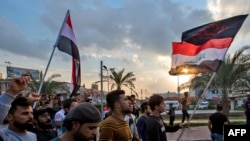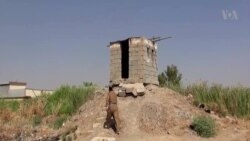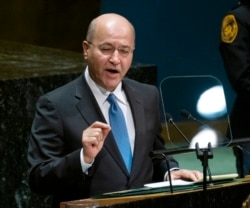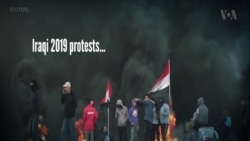The ongoing protests and violence in Iraq have already transformed the political landscape of the country in a major shakeup that the nation has not witnessed since the rise of the Islamic State (IS) in 2014, Iraqi politicians and experts say.
The recent unrest in Iraq began in October, when thousands of people in the capital, Baghdad, and major Shiite provinces in central and southern Iraq, took to streets to demand an end to corruption and misgovernance almost two years after the removal of IS.
The protests soon turned bloody, with security forces opening fire on protesters, leaving nearly 400 people dead and over 14,000 injured so far.
Ismail al-Hadidi, an adviser to the Iraqi Presidency Office, told VOA the wave of protests signal the need for the political establishment of the country to bring about sweeping reforms.
"The law, the constitution and the entire system will change. A new phase will appear," he told VOA. Such changes, he said, should prevent the political parties and armed militias from meddling in the government to advance their narrow interests at the expense of Iraq's 40 million population who live in worsening conditions despite the country's oil wealth.
New elections
In a move to appease angry protesters, Iraqi President Barham Salih last month in a national address called for the drafting of a new election law and said he approved an early election once the law is enacted.
Prime Minister Adel Abdul-Mahdi said Friday he would submit his resignation to the country's parliament. "I will submit to parliament an official memorandum resigning from the current prime ministry,'' the Abdul-Mahdi said, in response to the cleric's call. He did not specify when he will step down.
He had argued that his government, which took office in October 2018, has inherited many of the problems from former Cabinets.
Abdul-Mahdi last month offered a series of "realistic" concessions, including a reshuffle of his Cabinet and economic reforms, such as offering subsidies to the Iraqis living beneath the poverty line and introducing plans to reduce youth unemployment. Parliament also passed a law to reduce the salaries of high-ranking officials.
But these measures have failed to calm protesters, who see the government efforts as too little too late.
Mahmoud Osman, a Kurdish politician and a former member of the Iraqi parliament, told VOA there is a vast distrust among the people of Abdul-Mahdi's ability to address any of their demands. This lack of confidence in the prime minister, who is commander-in-chief of the security forces, has only deepened after their iron-fisted response against protesters, Osman said.
"The government initially did not approach the protesters to know about their demands and meet them before it was (too) late. Now, after about 400 people have been killed, 15,000 wounded, and nearly 4,000 handicapped, not a single perpetrator has been identified and brought to justice," he said.
Lethal use of force
According to watchdog Amnesty International, security forces have turned to lethal use of force, using military-grade tear gas grenades, live ammunition and deadly sniper attacks to disperse protesters. Amnesty also has reported a harsh campaign of intimidation and arrest against activists in Baghdad, including enforced disappearances
Prime Minister Abdul-Mahdi has said his government's measures are intended to end a "sedition" that threatens "the collapse of the regime and a dangerous civil clash."
"There are those who bears arms and kill. We cannot stand by without an answer because our duty is to maintain order just as it's to protect the protesters," Abdul-Mahdi said in a Cabinet meeting Thursday.
In yet another effort to appeal to protesters, he said he has ordered the release of 2,500 people arrested during violent clashes.
Ihsan al-Shammari, the head of the Iraq Center for Political Thought in Baghdad, told VOA the recent escalation in Iraq is a consequence of years of negligence and the government's failure to meet people's rising expectations following the fall of the Islamic State.
Iraqi government declared victory over IS in December 2017, but the group has remained active in the country mainly through militancy.
Post-IS reconstruction
"The emergence of IS in several Iraqi provinces, and the devastating human and infrastructure costs of the fight against it, all exposed the level of corruption, the fragility of state-building and institutions, and the responsibility of parties for this deteriorating reality," al-Shammari told VOA.
"There were those who made sacrifices during the war for a different Iraq and soon the situation continued as it was; corruption, quotas, exclusion and a minority control of the government," he added.
Sarhang Hamasaeed, the director of Middle East Programs at the U.S Institute for Peace, said the current violence in Iraq offers an opening for IS to exploit.
While the extremist group may not be in the position to control large population areas, the Iraqi federal government and the Kurdistan Region should work together to ensure IS does not use the current unrest to further reorganize itself in the provinces disputed between the two governments, Hamasaeed told VOA.
Hamasaeed agreed with the Iraqi government's assessment that blaming the current Cabinet for the unrest would be unfair, and that the country may need international assistance to address some of its pressing needs. But he said the Iraqi political elite has failed to show they are keen to take up the hard task of rebuilding their country after IS destruction.
An international conference in Kuwait in early 2018 collected about $30 billion, mostly in credit and investments, to help rebuild Iraq's economy and infrastructure.
Much of that commitment has not materialized.
"The international community does not have full faith on the political direction of the country," Hamasaeed told VOA. He added, "The political class of Iraq has not shown that it can lead Iraq in a direction that would prevent violence and instability and it would govern in favor of the Iraqi people."
People worry about external interference from neighbors like Iran and other concerns that may make any international investment in reconstruction in Iraq risky, he added.
Hamasaeed said there is also the so-called "Iraq fatigue," where the international community is just tired of continuing to spend on rebuilding what is destroyed there.
A key demand of demonstrators in the past weeks has been the ending of what they perceive as increasing Iranian influence in Iraqi affairs. Angry protesters Wednesday burned down an Iranian consulate in the southern city of Najaf.
VOA Kurdish Service's Dlshad Anwar contributed to this report from Kirkuk, Iraq.








